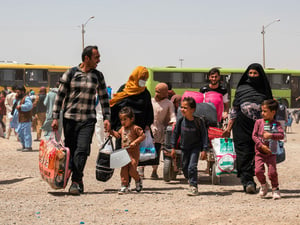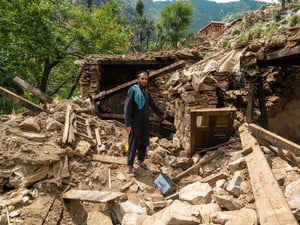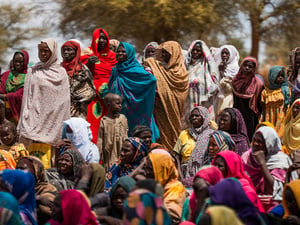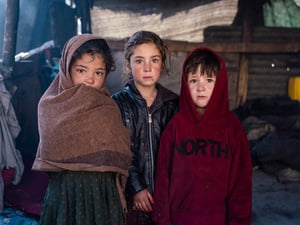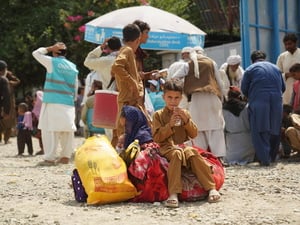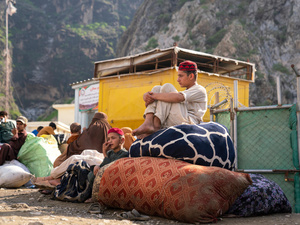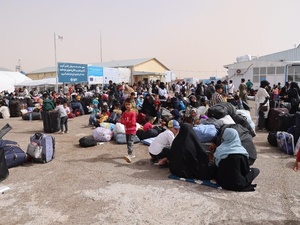UNHCR seeks US$18 million to assist Afghan refugees in Iran
UNHCR seeks US$18 million to assist Afghan refugees in Iran

Afghan refugee Amineh concentrates while using the sewing machine that has changed her life.
GENEVA, June 1 (UNHCR) - UNHCR is calling for US$18 million to meet an anticipated shortfall this year in its requested funding for Afghan refugees in the Islamic Republic of Iran.
UNHCR, whose programmes for Afghan refugees are in partnership with the Iranian government, has assessed comprehensive budget needs at US$36.8 million. However, to date only around a fifth of that sum has been received.
Voluntary repatriation of Afghans from Iran has slowed in recent years in the face of poor security and economic conditions in Afghanistan. Only 6,000 people returned last year and 3,600 in 2008. More than a million registered Afghans remain in Iran, with 97 per cent living in urban or semi-urban settings and creating a strain on health, education and other local infrastructure.
Iran, which is facing its own economic difficulties amid the global downturn, has hosted two generations of Afghan refugees but has received little international support. Refugees have benefitted from basic health and education services and usually have been able to earn a living.
Given the recent slower pace of returns, UNHCR has broadened its programme in Iran to better support services pending repatriation.
"However, at present we have funds to implement only 22 per cent of identified needs across education, health and livelihood support, as well as boosting water systems, latrines and other infrastructure in refugee settlements and in urban settings with high refugee concentrations," UNHCR spokesman Andrej Mahecic said Tuesday in Geneva. "The additional US$18 million is to help meet the gap," he added.
Many refugees in Iran are feeling the effects of rising inflation and struggle to pay food and medical costs. UNHCR believes the situation will worsen when Iran's new five-year national economic policy, expected to begin in 2010, takes effect. The new policy will see the removal of subsidies for electricity, water, other utilities and basic commodities like food. While the government will provide cash grants for Iranians, this will not be extended to refugees. Vulnerable refugees in particular will therefore need extra support.
"We do have an economic downturn, a global, regional and national one," said Carlos Zaccagnini, UNHCR's representative in Iran. "Refugees will face increasing hurdles to generate their own incomes and to sustain their livelihoods."
UNHCR wants to help refugees make ends meet by providing more skills training, self-reliance programmes and micro-credit schemes for the most vulnerable, but it will need a large injection of funds to help refugees face the challenges ahead.
Amineh Bakshi, 29, is among those who have benefited from UNHCR's existing self-reliance programme in Iran. Abandoned by her husband five years ago, she now lives in the north-east city of Mashad and runs a small sewing business from home to support her six-year-old son, elderly parents, two brothers and a sister.
She is one of 75 skilled but vulnerable people helped by UNHCR self-reliance projects in Mashad last year. The refuge agency gave her a sewing machine and she makes between US$10 and US$25 per week stitching shirts that are sold in local shops. Working from home, she can also look after her family.
"I do not know how I would have earned a living if I didn't have this sewing machine. I would have had to go outside to work, but [then] I could not have looked after my son," Amineh told UNHCR during a recent visit.
She has bought a second machine and hopes to expand the business. "I would like my son to go to school and graduate, and to have a better job and not have to be like me," the young woman confided.
Septuagenarian Ali Gohar Mousavi is another beneficiary of UNHCR's programme in Mashad. He makes prayer stones with a moulding machine supplied by UNHCR and he sells these to pilgrims in one of Iran's holiest cities. He earns US$100 to US$120 per month from this business, selling directly to shopkeepers in the city.
"If I worked in a labouring job I could earn more money, but I am old now and not well. This job is easier for me and I can work from home," he explained. "I am happy doing this and thank god I can earn a living in this way."
With additional funding from donors, UNHCR will be able to help more people like Amineh and Ali at a time of austerity. "Afghan refugees are very hard working. They have initiative and creativity. So if we leave it to them, with a little support and with a system that has worked with them for many years, then I think we will be able to meet the challenge," said UNHCR's Zaccagnini.
In addition to the 1 million registered Afghan refugees in Iran, there are some 48,000 refugees from Iraq. Since 2002, UNHCR has helped more than 860,000 refugees repatriate to Afghanistan. In addition, a million Afghans have returned home spontaneously since that time.
Ariane Rummery in Tehran contributed to this story

